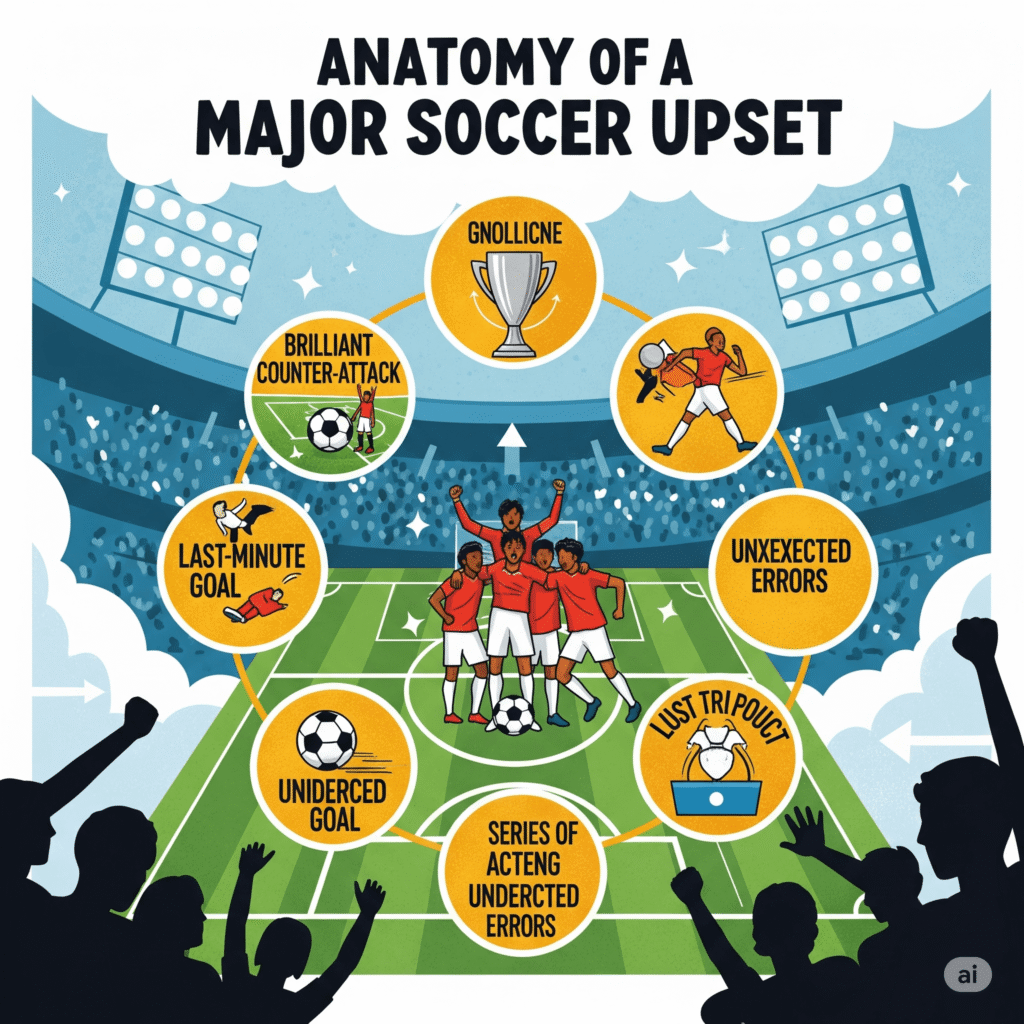Picture this: Real Madrid, the kings of European football, getting knocked out by Sheriff Tiraspol — a team most fans couldn’t even pronounce correctly. It happened. In 2021. At the Santiago Bernabéu. The bookmakers had Sheriff at 25-1 just to avoid defeat. They won 2-1. Somewhere in Moldova, a few lucky punters probably bought houses with their winnings. Welcome to the beautiful chaos of football upsets, where logic goes to die and dreams come alive.
The Leicester City phenomenon — how 5000-1 odds became reality
The 2015-16 Premier League season wasn’t supposed to belong to Leicester City. Hell, they weren’t even supposed to survive relegation the previous year. Claudio Ranieri was considered a managerial relic. Jamie Vardy was banging goals in non-league just four years earlier. Riyad Mahrez cost less than what Chelsea spent on their tea budget. Yet here we are, nearly a decade later, still talking about the most beautiful upset in football history.
The perfect storm of circumstances
Leicester’s triumph wasn’t just luck — it was a masterclass in timing. The big six were all going through transitions. Chelsea imploded spectacularly under José Mourinho. Manchester United were still figuring out life after Ferguson. Arsenal did their usual Arsenal thing, starting strong and fading when it mattered. The stars aligned, but Leicester still had to reach for them.
Ranieri’s tactical simplicity
While Pep Guardiola was preparing to revolutionize football with his tiki-taka philosophy, Ranieri went old school. Defend deep, hit them on the counter, rely on Vardy’s pace and Mahrez’s magic. Sometimes the most sophisticated strategy is having no strategy at all. The foxes proved that football’s beauty lies in its unpredictability.
The psychological breakthrough
The moment Leicester believed they could win wasn’t against Manchester City or Arsenal. It was probably that rainy Tuesday night against Newcastle when Vardy scored his tenth consecutive game. Something clicked. The impossible started feeling inevitable. That’s when smart money should have started flowing toward Leicester, but most bookmakers kept offering 50-1 odds well into February.
Tactical masterclasses that topple titans
Every major upset has a tactical mastermind pulling the strings. Think José Mourinho’s Inter dismantling Barcelona in 2010. Two legs, two different approaches, same devastating result. The Portuguese knew exactly how to neutralize Messi, Xavi, and Iniesta. He turned football into a chess match and checkmate came in the form of a 3-1 aggregate victory.
Modern upsets follow similar patterns. The underdog doesn’t try to outplay the favorite — they change the rules of engagement entirely. Look at how Sheriff approached Real Madrid. They didn’t attempt to dominate possession or play beautiful football. They defended with discipline, pressed at the right moments, and struck with surgical precision. Two shots on target, two goals. Football in its purest form.
- Defensive solidarity — Every player becomes a defender when out of possession
- Counter-attacking precision — Quality over quantity in forward moves
- Set-piece expertise — Dead ball situations become golden opportunities
- Psychological warfare — Early goals that shift momentum and belief
- Physical intensity — Outworking opponents who expect an easy night
- Home advantage exploitation — Making familiar surroundings count double
The beauty of these tactical approaches is their simplicity. You don’t need a £200 million squad to execute a perfect low block. You just need eleven players willing to run through walls for each other. That’s something money can’t always buy, no matter what Manchester City’s accountants say.
Psychology and momentum — the invisible forces behind shocking results
Football isn’t played on spreadsheets. It’s not about expected goals or possession percentages when the whistle blows. It’s about human beings with emotions, fears, and dreams. The moment an underdog scores first, something magical happens. The favorite starts questioning themselves. The crowd shifts. Commentators change their tone.
The weight of expectation
Manchester City entering a Champions League semifinal carries different pressure than Lyon reaching the same stage. City are expected to dominate, control, and win convincingly. Lyon just need to give their best shot. Guess who usually plays with more freedom? The psychological burden of being the favorite is real, and it’s heavy.
Momentum as currency
In football, momentum is more valuable than possession. It’s that intangible force that makes everything click. Passes find their target, tackles stick, shots fly true. When Sheriff scored their first goal against Real Madrid, you could feel the shift through television screens worldwide. Suddenly, the impossible felt possible.
The confidence cascade
One upset often leads to another. When Leicester started their title run, they began each game believing they could win. That confidence spread from player to player, match to match. By January, they weren’t playing like underdogs anymore — they were playing like champions who just hadn’t received their medals yet.
Key warning signs every bettor should recognize
Smart money recognizes patterns before they become obvious. The most profitable upsets rarely come from nowhere — there are always breadcrumbs leading to the shocking result. Learning to read these signs is the difference between watching history unfold and profiting from it.
- Recent form trajectories — When underdogs are improving while favorites stagnate
- Key player availability — Missing stars often matter more than bookmakers price in
- Motivational mismatches — Cup finals versus league games, relegation battles versus mid-table mediocrity
Leicester’s odds were still 2500-1 in August because bookmakers focused on historical data rather than current reality. They were signing N’Golo Kanté. They had hungry players with everything to prove. Meanwhile, Chelsea were dealing with player power struggles and Manchester United were buying expensive mediocrity. The writing was on the wall for anyone willing to read it.
Financial implications when the impossible happens
When Leicester won the Premier League, they didn’t just make history — they broke the bank. Bookmakers paid out millions to the few believers who backed them at astronomical odds. The total payout was estimated at over £25 million, making it one of the costliest upsets in betting history. But that’s just the beginning of the financial earthquake that follows major upsets.
The ripple effects extend far beyond betting shops. Sponsorship deals get renegotiated. Television rights become more valuable. Player valuations skyrocket overnight. Vardy went from Championship striker to England international. Mahrez transformed from £400,000 signing to £60 million Manchester City player. Economic miracles happen when sporting miracles unfold.
What separates legendary upsets from forgotten surprises
Not every upset becomes legend. Bradford City beating Chelsea 4-2 in the FA Cup was shocking, but it’s already fading from memory. Leicester’s title triumph will be discussed for generations. The difference isn’t just the magnitude of the achievement — it’s the narrative, the characters, and the lasting impact on football culture.
Legendary upsets change how we think about the sport itself. They prove that passion can overcome resources, that tactical intelligence can neutralize superior talent, that dreams don’t always have price tags attached. Iceland reaching the Euro 2016 quarterfinals wasn’t just about a small nation punching above its weight — it was about redefining what’s possible in modern football.
The greatest upsets don’t just shock us in the moment. They inspire future generations to believe that their impossible dreams might not be so impossible after all. And honestly? That’s worth more than any betting slip could ever pay out.



